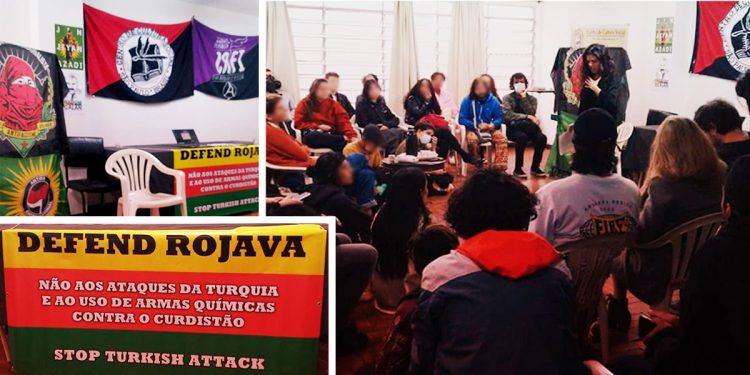BRAZIL – Yesterday afternoon (January 7th), dozens of people met at the Center for Social Culture in São Paulo – an anarchist collective, founded in 1933 in the city with the objective of being an environment for studies and debates, to discuss the theme of the Rojava Revolution and the importance of the women’s movement.
Organized by CAFI – Coletiva Anarcofeminista Insubmissas the comrade Rojda Dandara, who was present in Rojava for months working with the young women’s movement and the culture movement.
The topic of discussion at the meeting was the women’s struggle in Kurdistan and the intersectional struggles of women also in Brazil and the rest of the world, how the ongoing revolutionary process (more specifically in Rojava) can serve as a basis for further anti-patriarchal and decolonial struggles.
Talking about the event comrade Rojda Dandara said:
“Women and men of different ethnicities were present and several topics about the Rojava Revolution in the struggle for women’s liberation were discussed in order to clarify questions and create intersections between Rojava and the movements and collectives that fight in Brazil and in other territories of Abya Ayla. The principles of organization, struggle, love for the land, and self-defense were emphasized at various times as fundamental parts of the struggle for freedom and against our greatest enemy, the capitalist system. The women’s liberation movement in Kurdistan has continuously progressed through a collective process of forming different organizational structures in society.
Each step is taken with the goal of developing an alternative and free way of life, both for women and for the whole society. And, it is up to us to listen and learn from the different ethnic groups that live in Rojava and, united, have organized and put into practice a radical “laboratory” of democracy in constant transformation. It was also discussed that in order to build an ethical, meaningful, loving, democratic society based on equality and representativeness, the connection between all collectives, movements, and especially with society is fundamental (there will not be a social revolution without the participation of the population for the construction of a political and social project). But, for this, we must take into account that the struggle is internationalist, that is, worldwide in scope, based on the union of forces and on exchange, therefore the ties and connections that begin in one territory must expand to reach other struggles that aim to build an organization with strongly defined democratic values and principles.
Serkftein!”




